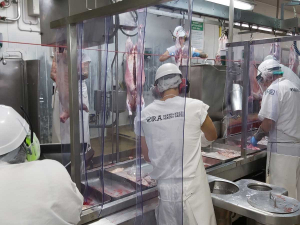Red line on dairy
OPINION: As India negotiates to open its borders to more global products, dairy is proving a sticky issue.
 There is massive demand for New Zealand beef and lamb in the US as that country struggles to cope with COVID-19.
There is massive demand for New Zealand beef and lamb in the US as that country struggles to cope with COVID-19.
There is massive demand for New Zealand beef and lamb in the United States as that country struggles to cope with COVID-19.
Beef+LambNZ’s general manager for market development, Nick Beeby, says there has been a slowdown in the supply processing chain in the US with some of the big plants that process either pork or beef having to close down or reduce capacity because of COVID, which has reduced the supply of meat.
According to his colleague Mike Wan, who is BLNZ’s global manager for the Red Meat Story, red meat plays a critical role in most American’s diets and he says there have been instances of panic buying of food in the US – including red meat.
“There are quite large shortages or significant delays within those retail outlets where people are not able to access meat for a considerable period of time. It could be a week or two weeks, or it could be put out on the shelves and sold within a day so,” he told Rural News.
“There is massive demand for red meat as US consumers hunker down and revert to more comfort based food they are familiar with as they look to boost their immunity and, I guess, continue a level of health and wellness while they are in the lockdown environment,” he says.
Wan says there is particular demand for lamb – a product some US consumers don’t traditionally buy and cook, but they are looking for quality protein. He says, as a result, there is demand for recipes as consumers source these and new ingredients to cook healthy meals.
“Because of the lockdown, they have more time to prepare meals and are looking for that element of freshness and healthiness,” he explains.
“It’s an ingrained thing with humans that when things aren’t going well, we revert to the familiar and those things that are probably a little less adventurous and closer to home in terms of traditional food in which we find comfort and helps boost immunity.”
Nick Beeby says the disruption is the greatest he has ever seen, with the food service sector having been virtually turned off to varying degrees.
He says a good-sized quantity of NZ lamb and beef go through this channel.
“All of sudden, you have to look for alternative channels into the market and what you find is the retail channel has picked up and there is exceptionally strong growth in e-commerce as well,” he told Rural News.
Beeby says NZ meat processing, exporting and marketing companies were extremely agile right from the early days when COVID-19 hit China. He says they suddenly had to look for places to sell meat where, in some instances, they may not have had a great footprint in the past.
“They were able to switch on and off pipelines quickly and keep product moving and kept the in-market prices at a really strong level,” he says. “I think we should be very proud of our sector in the way we have reacted.”
Dairy Women's Network (DWN) has announced that Taranaki dairy farmer Nicola Bryant will join its Trust Board as an Associate Trustee.
Rural Women New Zealand (RWNZ) says it welcomes the release of a new report into pay equity.
Red meat exports to key quota markets enjoyed $1.4 billion in tariff savings in the 2024-25 financial year.
Remediation NZ (RNZ) has been fined more than $71,000 for discharging offensive odours described by neighbours as smelling like ‘faecal and pig effluent’ from its compositing site near Uruti in North Taranaki.
Two kiwifruit orchards in the Bay of Plenty and one in Northland are this year's finalists for the Ahuwhenua Trophy competition.

OPINION: A mate of yours truly reckons rural Manawatu families are the latest to suffer under what he calls the…
OPINION: If old Winston Peters thinks building trade relations with new nations, such as India, isn't a necessary investment in…